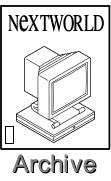 |  |  |  |  |  |  |
| | | | |

|

|
|
| |
October 1991 |
|
 |
|

|
 |
VCs back NeXT projects
by Dan Lavin
Redwood City, CA: In an increasingly tight market for venture capital, at least two firms developing NeXT-specific software successfully attracted initial funding last month.
Pages of San Diego will be using the venture funding to develop an advanced desktop publishing system. The package will run initially on the NeXT but will soon be ported to other platforms, said Robert F. Kibble, a general partner of Paragon Venture Partners, based in Menlo Park, California, which contracted to invest $2.5 million in the company.
"Our goal is to get to cash flow break-even on NeXT and choose a follow-up platform. The advantage of NeXT is that it will show [the product] very well and get a lot of people to want the product on another platform. This is a cheap proof of concept and avoids an expensive launch on other platforms," said Kibble.
The second company, unnamed at press time, will publish WriteNow and other programs (see NeXT Ink in this issue and NeXTWORLD Extra, September 1991). At press time, the president of the new company, Randy Adams, had not yet disclosed the amount or source of his venture funding, but said that the investment was wholly independent of NeXT.
According to a venture capitalist at one firm that was approached by the new company but that declined to participate in the deal, the new company was seeking up to $5 million in capital. He said top NeXT executives were involved in the funding proposal.
"NeXT was going to jump start the company by helping to provide software packages, special support, and special access," he said.
Venture funding often provides the means for a small company to bring a product to market. In return, the venture capitalists usually receive a significant share of equity in the company.
Trying to attract funding for these new companies brought a new factor into the traditional venture-capital equation: the health, and prospects for success, of NeXT itself.
"As part of our due diligence we had to investigate the chances of NeXT itself. We visited the factory and met with Steve [Jobs] directly several times," said Kibble, who finally concluded that the NeXT's technical sophistication is one of the "best-kept secrets" of the computer industry.
The fast development cycle on the NeXT platform was sure to save money for the firm, said Kibble. Paragon estimates that NeXT will have an installed base of 225,000 machines by the end of 1993, with Pages's product holding a 20 to 25 percent market share.
But other venture capitalists who were approached to fund Pages were less impressed by NeXT's technology and installed base. "The number of [NeXT users] is pretty low right now.
We like an opportunity to sell to millions of people," said Tench Coxe, general director of Sutter Hill Ventures of Palo Alto, California.
|
|